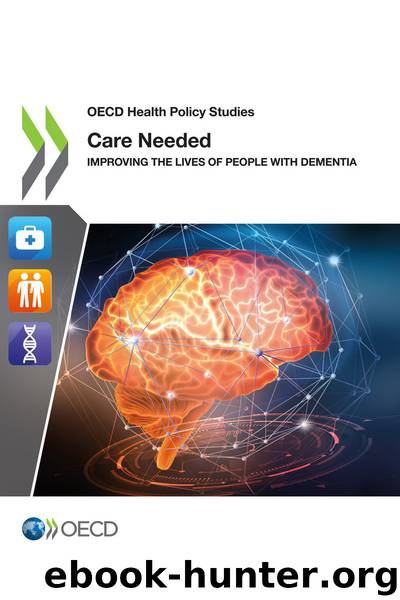Care Needed by OECD

Author:OECD
Language: eng
Format: epub
Tags: Social Issues/Migration/Health
Publisher: OECD Publishing
Published: 2018-06-11T16:00:00+00:00
Although most non-pharmacological treatments do not appear to alter the progress of dementia, they can play an important role in improving quality of life
Even where non-pharmacological interventions do not show an effect on cognition, they should be considered for the impact they can have on quality of life. So long as no cure for dementia exists, policies for people with dementia and their families and carers should equally consider how different programmes can affect their quality of life. This expanded conception of care beyond the clinical can challenge both health and social systems, where limited resources necessitate decision-making based on clinical outcomes and cost effectiveness. The range of quality of life measures developed for dementia, and recent emphasis on better incorporating patient- and carer-reported measures, is an encouraging step.
A range of alternative non-pharmacological interventions are regularly offered to people living with dementia, including arts- and music-based interventions. These interventions do not appear to have significant effects on cognitive decline, and the quality of current evidence is poor. However, arts-based therapies have been demonstrated to reduce depression and agitation among people living with dementia and improve their overall quality of life, as reported using carer- and patient-reported measures. Music, dance, and art therapies are regularly made available through community day centres, Alzheimer’s Associations, and local organisations. In Japan, art therapy and music programmes are made available to people living with dementia who attend community day care centres covered by care insurance (Suzuki et al., 2004). In the United States, the Alzheimer’s Association has developed a fine arts programme, Memories in the Making, intended to improve quality of life among people with early or moderate dementia through encouraging self-expression through art. Originally started in Cincinnati, Ohio, the programme has since spread to chapters of the Alzheimer’s Association throughout the United States. Because such programmes are largely organised by non-profit organisations and are not part of official care pathways for dementia, information related to their coverage and reach is in most cases limited.
The evidence base supporting most non-pharmacological treatments has largely comprised of short-term evaluations focused on different aspects related to quality of life or reductions in depression and agitation. The different methods of evaluating quality of life has made comparing the findings between studies difficult and points to the importance of developing strong measures of patient-reported measures that can be used across research settings. There is much more limited evidence related to the effects of non-pharmacological interventions on cognition, though some evidence to suggest that cognitive and exercise interventions may have a limited impact on cognition.
As discussed above, a range of non-pharmacological treatments have been found to improve quality of life measures for people living with dementia or their carers, even in the absence of cognitive improvement. These programmes, including exercise therapies, arts-based therapies, and other social group activities, should be made available to people with dementia wherever possible, either through government-funded day centres or non-profit institutions. At the very least, such activities promote social contact and can help to prevent isolation and loneliness in people with dementia.
Download
This site does not store any files on its server. We only index and link to content provided by other sites. Please contact the content providers to delete copyright contents if any and email us, we'll remove relevant links or contents immediately.
| Administration & Medicine Economics | Allied Health Professions |
| Basic Sciences | Dentistry |
| History | Medical Informatics |
| Medicine | Nursing |
| Pharmacology | Psychology |
| Research | Veterinary Medicine |
Good by S. Walden(3540)
The Social Psychology of Inequality by Unknown(3011)
0041152001443424520 .pdf by Unknown(2839)
The Checklist Manifesto by Atul Gawande(2835)
Get What's Yours for Medicare: Maximize Your Coverage, Minimize Your Costs by Philip Moeller(2560)
The Meaning of the Library by unknow(2555)
Guns, Germs and Steel by Diamond Jared(2353)
Borders by unknow(2300)
23:27 by H. L. Roberts(2241)
And the Band Played On by Randy Shilts(2181)
Being Mortal: Medicine and What Matters in the End by Atul Gawande(2101)
A Leg to Stand On by Oliver Sacks(2026)
The Hot Zone by Richard Preston(2006)
More Than Words (Sweet Lady Kisses) by Helen West(1851)
The Valachi Papers by Peter Maas(1842)
The Laws of Medicine by Siddhartha Mukherjee(1787)
The Andromeda Strain by Michael Crichton(1737)
The Obesity Epidemic by Robyn Toomath(1662)
Get What's Yours for Medicare by Philip Moeller(1649)
